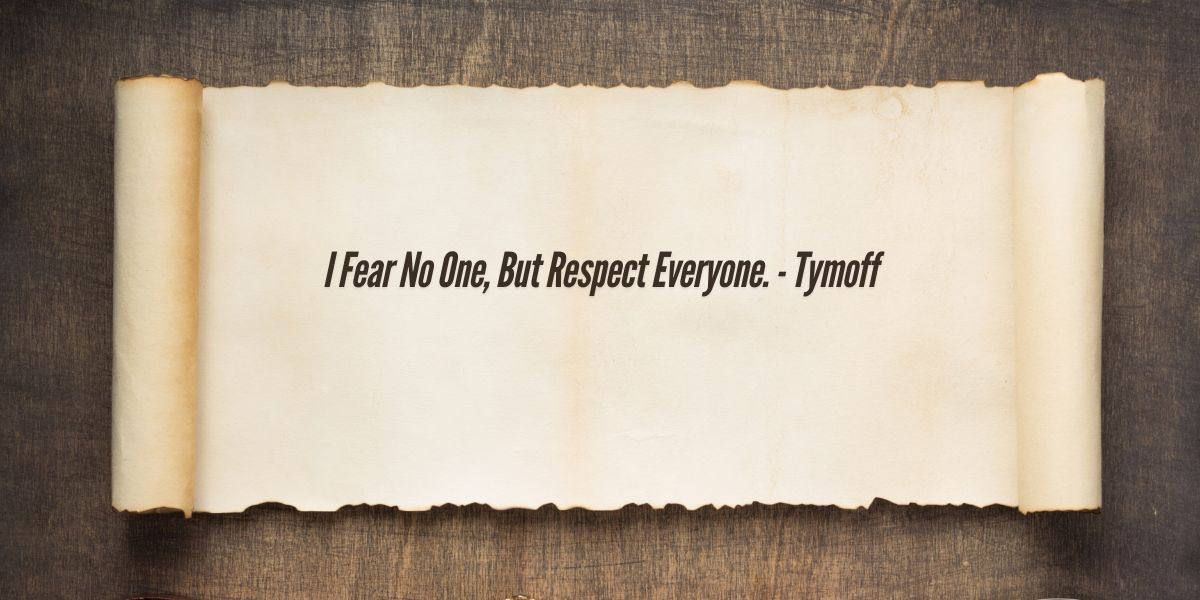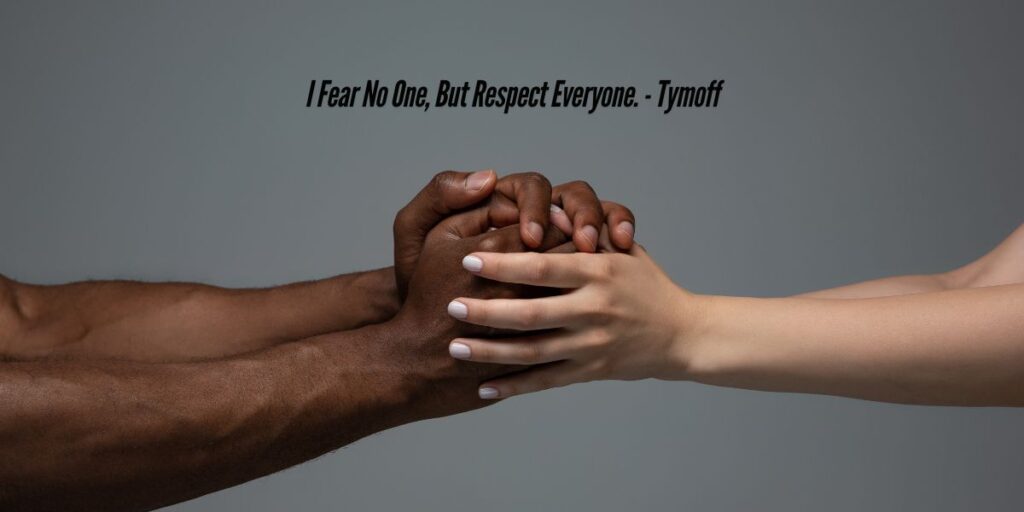I Fear No One, But Respect Everyone. – Tymoff

I Fear No One, But Respect Everyone. - Tymoff
The statement “I fear no one, but respect everyone” is more than just a phrase; it’s a powerful philosophy that embodies confidence, humility, and mutual understanding. Popularized in various contexts, including on platforms like Tymoff, this principle resonates deeply in both personal and professional spheres. But what does it truly mean, and how can it impact our lives? Let’s dive into its essence, practical applications, and significance.
What Does “I Fear No One, but Respect Everyone” Mean?
I Fear No One, But Respect Everyone. – Tymoff, This statement is a blend of courage and courtesy. It signifies:
- Fearlessness: Standing firm in your beliefs without intimidation.
- Respectfulness: Acknowledging others’ worth, regardless of differences or positions.
At its heart, this philosophy encourages individuals to live boldly while fostering a culture of mutual respect.
Why Respect Triumphs Over Fear
Fear vs. Respect: Understanding the Difference
Fear is a reaction to perceived threats or power, often creating anxiety and distrust. Respect, on the other hand, is built on admiration and understanding.
| Aspect | Fear | Respect |
|---|---|---|
| Source | Power or intimidation | Mutual acknowledgment |
| Effect | Anxiety, avoidance | Trust, collaboration |
| Longevity | Temporary compliance | Long-lasting relationships |
Does Fear Earn Respect?
No, fear does not earn genuine respect. While fear can compel people to follow orders or conform, it creates resentment. True respect arises from integrity, empathy, and fairness.
Read Also: feedbuzzard advertise | contacts seattlesportsonline
Origins of the Philosophy

While the origins of “I fear no one, but respect everyone” are unclear, its universal appeal is rooted in timeless wisdom. Philosophers, leaders, and spiritual thinkers across cultures have emphasized the value of courage paired with humility.
Applying the Motto in Everyday Life
1. Personal Relationships
Respect strengthens bonds, whether in friendships, family, or romantic partnerships. Living without fear fosters open communication, while respect ensures fairness and understanding.
2. Workplace Dynamics
In professional settings, fear-based management leads to toxicity, whereas respectful leadership builds morale and productivity.
3. Social Settings
By embodying this philosophy, you can engage with diverse groups confidently while appreciating differing perspectives.
Benefits of Living Fearlessly and Respectfully
- Enhanced Self-Confidence: Fearlessness promotes a positive self-image.
- Stronger Relationships: Respect nurtures trust and cooperation.
- Improved Decision-Making: Without fear clouding judgment, decisions become clearer and more rational.
- Inspiring Others: Leading by example encourages others to adopt similar values.
Common Misinterpretations of the Motto
- Fearlessness Equals Arrogance: True fearlessness is not about belittling others; it’s about standing firm with humility.
- Respect Means Submissiveness: Respecting someone doesn’t mean agreeing with everything they say. It’s about valuing their opinions while staying true to your own beliefs.
“I Fear No One, but Respect Everyone” in Leadership
Respectful yet fearless leadership fosters a positive and innovative work environment. Leaders who follow this principle inspire trust, loyalty, and dedication in their teams.
Cultural Perspectives on Fear and Respect
Different cultures interpret fear and respect uniquely:
- Eastern Cultures: Emphasize respect as a core societal value.
- Western Cultures: Focus on individuality and fearless self-expression.
Despite these differences, the principle of balancing fearlessness with respect resonates universally.
Fear vs. Respect: Key Differences
| Characteristic | Fear | Respect |
|---|---|---|
| Driven By | Dominance or intimidation | Understanding and admiration |
| Emotional Response | Anxiety, resentment | Trust, goodwill |
| Impact on Relationships | Strained, short-lived | Strong, enduring |
How Tymoff Promotes This Philosophy
Platforms like Tymoff often highlight powerful quotes like “I fear no one, but respect everyone” to inspire individuals to lead balanced and meaningful lives. These platforms serve as reminders to live with courage and kindness.
Practical Tips to Cultivate Respect Without Fear
- Practice Active Listening: Pay attention to others’ perspectives.
- Set Boundaries: Fearlessness involves standing your ground while maintaining respect.
- Be Empathetic: Understand the challenges others face.
- Lead by Example: Show respect through your actions to inspire others.
The Role of Empathy in Respectful Living

Empathy is the bridge between fearlessness and respect. By understanding others’ emotions and experiences, you can connect with them on a deeper level while staying confident in your principles.
Read Also: software techoelite | eleanor talitha bailey
How to Embody “I Fear No One, but Respect Everyone” in Challenging Situations
I Fear No One, But Respect Everyone. – Tymoff, Living by this motto is easier said than done, especially in challenging situations. Here are some strategies to help you remain grounded in this principle:
1. Handling Criticism
When faced with criticism, it’s easy to feel defensive or intimidated. Instead:
- Stay Fearless: Accept constructive criticism without fear of judgment.
- Show Respect: Thank the person for their feedback, even if you disagree.
2. Navigating Conflicts
Conflicts can test your ability to balance fearlessness and respect.
- Be Assertive: Express your opinions clearly without aggression.
- Be Respectful: Avoid personal attacks and listen to the other person’s perspective.
3. Facing Authority Figures
It’s natural to feel intimidated by those in positions of power. However:
- Don’t Fear: Remember that authority doesn’t diminish your worth.
- Offer Respect: Acknowledge their role without compromising your self-esteem.
The Philosophy in Personal Growth and Development
Adopting “I fear no one, but respect everyone” as a guiding principle can significantly contribute to your personal growth.
Building Inner Strength
Fearlessness develops resilience and confidence, enabling you to overcome challenges with ease.
Fostering Emotional Intelligence
Respecting others helps you build empathy, enhancing your ability to connect and communicate effectively.
Encouraging Lifelong Learning
By respecting diverse perspectives, you remain open to new ideas and experiences, fostering continuous growth.
Why This Philosophy Resonates with Today’s World
In a world marked by competition, social divisions, and constant change, the motto “I fear no one, but respect everyone” is more relevant than ever.
1. Promoting Inclusivity
This mindset encourages the acceptance of different cultures, beliefs, and opinions, fostering unity in diversity.
2. Counteracting Toxicity
By prioritizing respect over fear, we can counteract negativity in workplaces, relationships, and social interactions.
3. Inspiring Future Generations
Teaching this principle to the next generation instills values of courage, kindness, and mutual respect.
Real-Life Examples of the Philosophy
Historical Figures
Many influential leaders have embodied this motto, balancing fearlessness with respect to create lasting impacts:
- Mahatma Gandhi: Led with unwavering courage and deep respect for humanity.
- Martin Luther King Jr.: Advocated fearlessly for civil rights while respecting diverse communities.
Modern Applications
In today’s world, many individuals and organizations embrace this principle to foster positive relationships and environments. Platforms like Tymoff, for example, amplify such values through motivational content and personal growth insights.
Overcoming Fear to Embrace Respect

Letting go of fear is a critical step toward fully embodying this philosophy. Here are actionable tips:
- Understand Your Fears: Identify what intimidates you and why.
- Challenge Limiting Beliefs: Replace thoughts of inadequacy with affirmations of self-worth.
- Practice Self-Respect: Confidence in yourself is the foundation for respecting others.
- Focus on Growth: Treat failures as opportunities to learn rather than sources of fear.
Read Also: wallpaper:hjotduwi72m= thanksgiving | tomtechblog com
Conclusion
The motto “I fear no one, but respect everyone” encapsulates a powerful way of living. It teaches us to lead with courage while valuing others, creating a harmonious balance between self-confidence and mutual understanding. By integrating this philosophy into our daily lives, we can cultivate stronger relationships, overcome challenges, and inspire others to do the same.
FAQs
1. How can I stop fearing others while maintaining respect?
Focus on building self-confidence and understanding that everyone has unique strengths and weaknesses. Respect others for who they are while standing firm in your values.
2. What is the difference between fear and respect in relationships?
Fear creates distance and mistrust, while respect fosters closeness and understanding. Respect is mutual, while fear often stems from power imbalances.
3. Can respect and fear coexist?
While they can coexist in some situations (e.g., respecting an authoritative figure you fear), genuine respect thrives in the absence of fear.
4. How does this philosophy apply to leadership?
Leaders who are fearless yet respectful inspire trust, loyalty, and collaboration, creating a positive and productive environment.
5. Why is “I fear no one, but respect everyone” important in today’s world?
It promotes inclusivity, combats toxicity, and fosters unity, making it a timeless principle for building meaningful connections and thriving in diverse settings.





